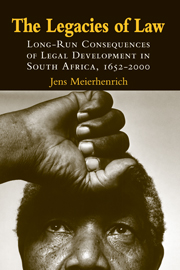Preface and Acknowledgments
Published online by Cambridge University Press: 18 December 2009
Summary
I happened upon the subject matter of this book – the function of law in times of transition – about a decade ago. I was rereading at the time, for no particular reason at all, Ernst Fraenkel's The Dual State: A Contribution to the Theory of Dictatorship (New York: Oxford University Press, 1941), a highly original yet largely forgotten study of the law of the “Third Reich.” Written by a German labor lawyer of Jewish faith, The Dual State remains one of the most absorbing books – drafted clandestinely in the mid-1930s – ever published in the public law tradition. It was this rereading of The Dual State that inspired my “redescription,” to borrow Ian Shapiro's term, of apartheid and apartheid's endgame.
I had first encountered Fraenkel – alongside Max Weber and Carl Schmitt – in the early 1990s, as a first-year student of law as well as political science and sociology in my native Germany. I was intrigued by the provocative argument contained in The Dual State and its lucid elaboration. I marveled at the effortless blend of insights from numerous disciplines and its deep grounding in the jurisprudence of Weimar Germany. At the time, however, I was preoccupied with comprehending the minutiae of constitutional law in the Federal Republic of Germany rather than the discredited legal theory and practice of the regimes – authoritarian and totalitarian – that had preceded it.
- Type
- Chapter
- Information
- The Legacies of LawLong-Run Consequences of Legal Development in South Africa, 1652–2000, pp. xiii - xviiiPublisher: Cambridge University PressPrint publication year: 2008



